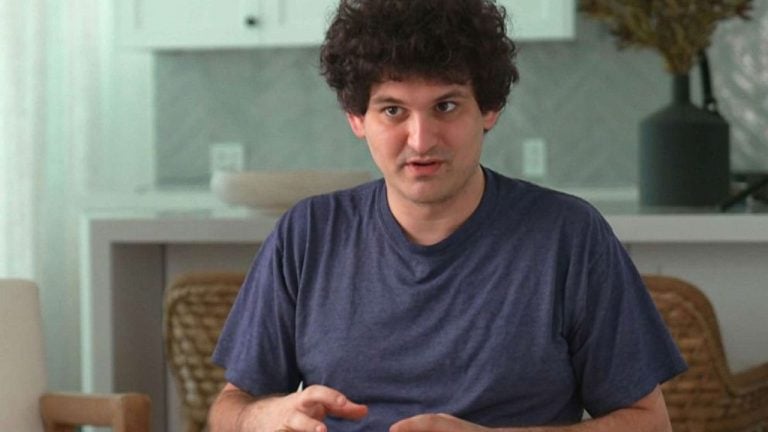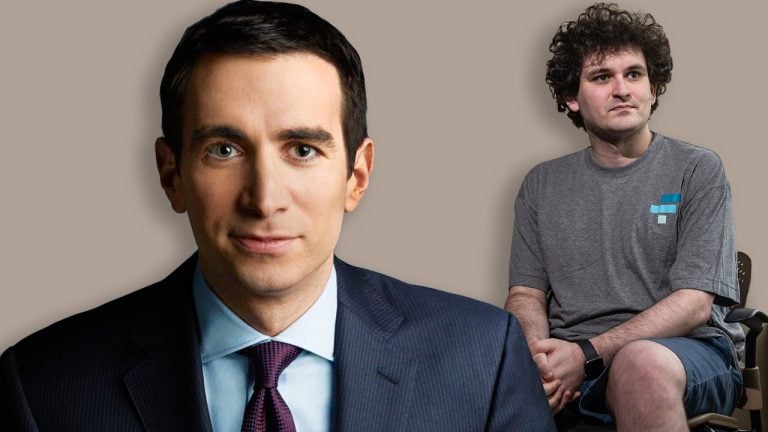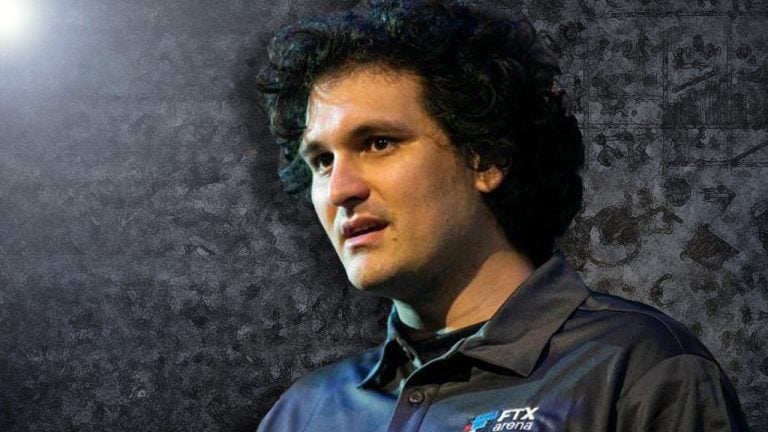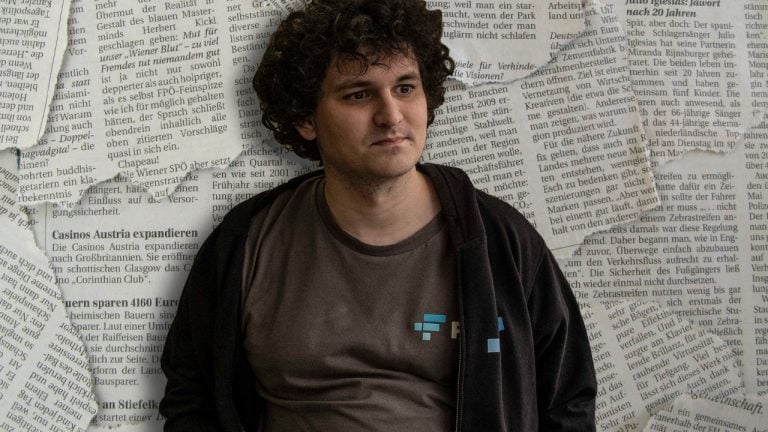 While the former FTX CEO Sam Bankman-Fried (SBF) has done numerous interviews, during these discussions he’s explained on numerous occasions that as far as Alameda Research is concerned, he “wasn’t running Alameda.” SBF wasn’t the CEO of the trading firm Alameda Research as the job was handled by Caroline Ellison, a former Jane Street trader […]
While the former FTX CEO Sam Bankman-Fried (SBF) has done numerous interviews, during these discussions he’s explained on numerous occasions that as far as Alameda Research is concerned, he “wasn’t running Alameda.” SBF wasn’t the CEO of the trading firm Alameda Research as the job was handled by Caroline Ellison, a former Jane Street trader […] Former FTX CEO Sam Bankman-Fried (SBF) has been talking a lot more since his exchange collapsed a few weeks ago, as he’s spoken at the New York Times Dealbook Summit, sat down with Good Morning America host George Stephanopoulos, and recently conducted an interview with New York Magazine. While doing all of these interviews, SBF […]
Former FTX CEO Sam Bankman-Fried (SBF) has been talking a lot more since his exchange collapsed a few weeks ago, as he’s spoken at the New York Times Dealbook Summit, sat down with Good Morning America host George Stephanopoulos, and recently conducted an interview with New York Magazine. While doing all of these interviews, SBF […] On Nov. 30, 2022, the former FTX CEO Sam Bankman-Fried (SBF) discussed FTX’s collapse at the New York Times’ Dealbook Summit with Andrew Ross Sorkin in his first live-appearance interview since the crypto exchange’s downfall. SBF told the Dealbook Summit host that he was “deeply sorry about what happened” and further stressed that he “didn’t […]
On Nov. 30, 2022, the former FTX CEO Sam Bankman-Fried (SBF) discussed FTX’s collapse at the New York Times’ Dealbook Summit with Andrew Ross Sorkin in his first live-appearance interview since the crypto exchange’s downfall. SBF told the Dealbook Summit host that he was “deeply sorry about what happened” and further stressed that he “didn’t […]
Billions of dollars have been poured into Meta’s virtual world with little return on investment, but CEO Mark Zuckerberg says he is holding fast.
Meta CEO Mark Zuckerberg is still hopeful about the company’s Metaverse plans regardless of the billions of dollars it’s sucking up from the company, claiming “someone has to build that.”
Appearing remotely for an interview at the Nov. 30 DealBook Summit in New York, Zuckerberg was asked his thoughts on whether the tech giants’ Metaverse play was still viable given its cost and the doubts cast over the platform, answering:
“I think things look very different on a ten-year time horizon than the zone that we're in for the next few years [...] I'm still completely optimistic about all the things that we've been optimistic about.”
He added part of “seeing things through” in the longer term was “powering through” the doubts held about its ambitions.
Meta's latest earnings, released on Oct. 26, revealed the largest-ever quarterly loss in its metaverse-building arm Reality Labs dating back to the fourth quarter of 2020. Zuckerberg’s virtual reality has cost $9.44 billion in 2022, closing in on the over $10 billion in losses recorded for 2021.
On the earnings call at the time Zuckerberg was unfazed by the cost, calling its metaverse the “next computing platform.” He doubled down on this claim at DealBook:
“We're not going to be here in the 2030s communicating and using computing devices that are exactly the same as what we have today, and someone has to build that and invest in it and believe in it.”
However, Zuckerberg admitted that the plans have come at a cost, Meta had to lay off 11,000 employees on Nov. 9 and the CEO said it had “planned out massive investments,” including into hardware to support its metaverse.
He said the company “thought that the economy and the business were going to go in in a certain direction” based on positive indicators relating to e-commerce businesses during the height of the COVID-19 pandemic in 2021. “Obviously it hasn't turned out that way,” Zuckerberg added.
“Our kind of operational focus over the next few years is going to be on efficiency and discipline and rigor and kind of just operating in a much tighter environment.”
Despite the apparent focus from Meta to build its metaverse, Zuckerberg claimed 80% of company investments are funneled into its flagship social media platforms and will continue that way “for quite some time.”
Investments in Reality Labs are “less than 20%” at least “until the Metaverse becomes a larger thing” he said.
Related: The metaverse is happening without Meta's permission
Of the 20% invested in Reality Labs, Zuckerberg said 40% of it goes toward its Virtual Reality (VR) headsets with the other “half or more” building what he considers “the long-term most important form factor [...] Normal-looking glasses that can put holograms in the world.”
Zuckerberg also took a few jabs at its peer tech company Apple regarding its restrictive App Store policies, the likes of which have placed restrictions on crypto exchanges and nonfungible token (NFT) marketplaces, saying:
“I do think Apple has sort of singled themselves out as the only company that is trying to control unilaterally what apps get on a device and I don't think that's a sustainable or good place to be.”
He pointed to other computing platforms such as Windows and Android which are not as restrictive and even allow other app markets and sideloading — the use of third-party software or apps.
He added its been Meta’s commitment to allow sideloading with its existing VR units and upcoming Augmented Reality (AR) units and hoped the future Metaverse platforms were also open in such a manner.
“I do think it is it is problematic for one company to be able to control what kind of app experiences get on the device.”

The former FTX CEO has offered multiple apologies and admitted failings at least a dozen times during the one-hour interview.
Former FTX CEO Sam Bankman-Fried apologized or admitted failure at least 12 times during his appearance at the New York Times' DealBook Summit on Nov. 30.
In a wide-ranging video interview, Bankman-Fried was asked to answer a number of questions surrounding the downfall of the now-defunct exchange, with some even suggesting that some of his statements could be used to incriminate him in legal proceedings.
In a Nov. 30 Twitter post, crypto attorney Jeremy Hogan, Partner at Hogan & Hogan said that the “light cross-examination” of Bankman-Fried at the DealBook Summit has already returned “at least 3 incriminating statements so far.”
SBF is getting a light cross-examination at the NYT/Dealbook Summit and has made at least 3 incriminating statements so far.
— Jeremy Hogan (@attorneyjeremy1) November 30, 2022
Why are his lawyers (or parents) letting him do this?? pic.twitter.com/Nd0poutAA0
Alan Rosca from the law firm Rosca Scarlato said it was “pretty astonishing that he’s in effect testifying at the DealBook summit. Hard to think of a precedent for this.”
Bankman-Fried’s first concession came while greeting interviewer Andrew Sorkin, when he said in reference to the collapse of FTX:
“Clearly, I made a lot of mistakes or things I would give anything to be able to do over again.”
An apology came moments later when Sorkin confronted him with a letter written by an FTX customer who lost $2 million in life savings after the exchange collapsed.
“I'm deeply sorry about what happened,” said Bankman-Fried in response to the customer's story.

Later, when discussing the allegations that Alameda used FTX client funds to cover loans, Bankman-Fried said that while he “didn't know exactly what was going on” at Alameda,” he concedes it was still his duty as FTX CEO to “make sure I was doing diligence.”
“A lot of these are things that I've learned over the last month that I learned [...] I mark that as a pretty big oversight that I wasn't more aware of,” he said.
Bankman-Fried admitted failure again when quizzed about FTXs former standing in the industry and the loss of trust in crypto now that the exchange has collapsed, stating: “I mean, like, look, I screwed up.”
“I was CEO, I was the CEO of FTX. And I mean I say this again and again, that that means I had a responsibility that means that I was responsible ultimately for doing the right things and I mean, we didn't. Like, we messed up big.”
He continued to concede FTX’s failings, stating “there absolutely were management failures” oversight failures, and transparency failures.
Toward the end of the interview, Sorkin directly asked Bankman-Fried whether he had been truthful with the audience and whether he agreed that there had been times that he had lied.
Bankman-Fried said he wasn’t aware of any times that he lied, but explained that there were times when asking as a representative or “marketer” for FTX, that he would paint FTX “as compelling [...] as possible.”
“I wasn’t talking about what are the risks involved with FTX […] I obviously wish that I spent more time dwelling on the downsides and less time thinking about the upsides.
Related: ‘I never opened the code for FTX:’ SBF has long, candid talk with vlogger
Bankman Fried was asked what his lawyers are telling him at the moment, and whether it was a good idea for him to be speaking publicly. He answered “very much not.”
“I mean, you know, the classic advice, don’t say anything [...] recede into a hole.”
Bankman-Fried said he believes he has a duty to talk to people and explain what happened and to “try and do what’s right.”
"I don't see what good is accomplished by me just sitting locked in a room pretending the outside world doesn't exist," he explained.
While the interview appeared to cover a number of confronting issues for Bankman-Fried, some in the community still believe that the questions were not challenging enough, nor was there an adequate follow-up to some of the hard-hitting questions.
A Twitter poll launched by a self-proclaimed crypto trader “Cantering Clark” found that more than half of the 1,119 respondents believed Sorkin “Soft-balled” the interview with Bankman-Fried.
 On Nov. 29, 2022, the crypto supporter and reporter, Tiffany Fong, published an interview with the former FTX CEO Sam Bankman-Fried (SBF) that was recorded 13 days before the interview was released. During the interview, SBF discussed who he thinks may have hacked FTX and he further denied he had a backdoor installed to funnel […]
On Nov. 29, 2022, the crypto supporter and reporter, Tiffany Fong, published an interview with the former FTX CEO Sam Bankman-Fried (SBF) that was recorded 13 days before the interview was released. During the interview, SBF discussed who he thinks may have hacked FTX and he further denied he had a backdoor installed to funnel […]
Mainstream media outlets just can’t seem to stop drooling over the disgraced FTX founder.
Nearly three weeks have passed since FTX founder Sam “SBF” Bankman-Fried announced that his exchange was facing a deep liquidity crisis, was unable to find a last-minute bailout, and was forced to file for Chapter 11 bankruptcy. The insolvency impacted millions of investors, leaving many portfolios completely wiped out.
Bankman-Fried has openly admitted that FTX loaned customer deposits to Alameda Research, FTX’s sister hedge fund, although he has characterized this as a mistake that was caused by “confusing internal labeling.” FTX’s terms of service explicitly state that customer funds will never be lent to other financial institutions or used by FTX for proprietary trades. Sam publicly stated in a now-deleted tweet, “We don’t invest client assets (even in treasuries).”
The broader crypto markets have bled red in response, and other industry stalwarts now face insolvency risk with the contagion spreading to Genesis, Grayscale and many other firms that held assets on FTX or were owed money by Alameda Research.
Related: The fall of FTX and Sam Bankman-Fried might be good for crypto
FTX’s new turnaround CEO John Ray III stated in court documents, “Never in my career have I seen such a complete failure of corporate controls and such a complete absence of trustworthy financial information as occurred here.” In the same court documents, FTX admitted that it may have more than 1 million creditors, the majority of whom were users who lost money when SBF took it and loaned it to Alameda Research for its proprietary trading business.
In the wake of Bankman-Fried’s actions, it’s deeply appalling that mainstream media outlets like The Wall Street Journal, The New York Times, The Washington Post, Forbes, and many others have covered the FTX scandal and ensuing meltdown with kiddy gloves, refusing to call out Bankman-Fried and his inner circle for using and abusing customer funds.
Cancel Culture has wiped out a lot of people yet the @WSJ and @nytimes still trying to rehab and protect the imagine of Sam Bankman-Fried. So many young people looking to make their way in life have been wiped out.
— Charles V Payne (@cvpayne) November 24, 2022
The "elites" protect their own even under a microscope. pic.twitter.com/ZaUjLi7TTz
Instead, these publications have largely framed the FTX disaster as a series of honest mistakes by overly ambitious and quirky entrepreneurs that adhere to the effective altruism movement. Bankman-Fried and insiders like Caroline Ellison, former CEO of Alameda Research, were simply trying to do good for the world and will no longer be able to see their benevolent aspirations through.
The Wall Street Journal, for instance, published an article focused primarily on Bankman-Fried’s charitable aspirations — while lightly glossing over the fact that he misused customer funds:
Bankman-Fried has said his law-professor parents instilled in him an interest in utilitarianism, the philosophy of trying to do the greatest good for the greatest number of people. He said he started putting those ideals into practice while majoring in physics at MIT. Concerned with the suffering of animals on factory farms, he said, he stopped eating meat.
The WSJ also delved into the FTX Foundation and its Future Fund (a nonprofit arm of FTX), discussing how many good causes are no longer able to collect on promised grants:
Related: Will SBF face consequences for mismanaging FTX? Don’t count on it
“The collapse of Mr. Bankman-Fried’s empire has reverberated well beyond its Bahamas base, through the halls of academia and pioneering laboratories around the world. Several grant recipients [...] were still owed funds when FTX failed, according to people familiar with the matter.”
Not once did the WSJ condemn Bankman-Fried for his actions. While it discussed multi-million dollar losses that charitable causes have suffered, it failed to mention the multiple billions that were stolen from FTX customers who were promised their deposits were safe.
Similarly, The Washington Post reported that Sam Bankman-Fried and his brother Gabe wanted to make a difference after the global pandemic rocked the world in 2020:
A Washington Post review of lobbying disclosures, federal records and other sources found that the brothers and their network have spent at least $70 million since October 2021 on research projects, campaign donations and other initiatives intended to improve biosecurity and prevent the next pandemic.
The publication omitted the fact that charitable donations were, in fact, funded by money SBF obtained from customers. The article further lamented that the brothers will no longer be able to fund their pandemic-related philanthropic efforts:
But the sudden collapse of FTX, which filed for bankruptcy last Friday after reports that customer funds were being used to prop up a sister trading firm, has sparked a financial contagion expected to doom the brothers’ pandemic-prevention agenda.
Unfortunately, the impact of FTX collapsing goes far beyond negatively impacting pandemic-prevention funding. Millions of people lost their money by trusting FTX to custody their crypto. Companies using FTX to hold their corporate treasuries are now going under. Hedge funds, venture capitals, and centralized finance platforms have all been severely crippled, with some investors that have otherwise outperformed the market now facing 50% losses because of the embezzling of their funds.
I can't believe mainstream media is still running stories about Sam Bankman-Fried without a single mention of his criminality.
— Jake Chervinsky (@jchervinsky) November 27, 2022
This is a con man who perpetrated a historic fraud. He stole billions of dollars from unsuspecting victims. How is that not the lead of every story??
Perhaps the most egregious reports have come from The New York Times. In one widely criticized puff piece, the author painted a picture of an ambitious but overextended entrepreneur who made mistakes but did so legally. With a little bit more oversight or perhaps a larger team, they advised, these costly mistakes may have been avoided. They even described SBF as a philanthropist who let his charitable ambitions get too large:
Even as he kept hiring down, Mr. Bankman-Fried built an ambitious philanthropic operation, invested in dozens of other crypto companies, bought stock in the trading firm Robinhood, donated to political campaigns, gave media interviews and offered Elon Musk billions of dollars to help finance the mogul’s Twitter takeover. Mr. Bankman-Fried said he wished ‘we’d bitten off a lot less.’
The downright offensive reporting painted the embattled ex-CEO as simply being too busy and overworked to properly monitor what was going on in his companies.
FTX and Alameda Research are described as closely linked. However, they are not described as related parties that should have clear restrictions when doing business with one another. In no world was it appropriate to commingle funds between the two parties when FTX’s assets were primarily customer funds. Instead, the article explained Bankman-Fried’s defense of the muddied relationship by pointing out that Alameda is a crucial market maker and liquidity provider to FTX.
Related: My story of telling the SEC ‘I told you so’ on FTX
In a follow-up post, the NYT explored SBF’s political and charitable contributions in depth, describing the now-shamed entrepreneur as the Democratic Party’s second-largest donor behind George Soros, and depicting his broad influence on politics and regulation:
A network of political action committees, nonprofits and consulting firms funded by FTX or its executives worked to court politicians, regulators and others in the policy orbit, with the goal of making Mr. Bankman-Fried the authoritative voice of crypto, while also shaping regulation for the industry and other causes, according to interviews, email exchanges and an encrypted group chat viewed by The New York Times.
Amid the discussion of his numerous donations, the article never once posited where Bankman-Fried’s generous funding came from. There is no mention that FTX and Alameda are now bankrupt, and that many lives are ruined. Funds that were stolen from users to prop up FTX’s equity value or FTT’s price that are then used for political and charitable donations should be clawed back. Put simply, the money was not Bankman-Fried’s to give.
Forbes wrote a similar puff piece on the other antagonist in the FTX downfall and former CEO of Alameda Research, Caroline Ellison. It led with effusive compliments for the now-fired executive:
Alameda Research CEO Caroline Ellison is a math whiz who loves Harry Potter, fringe political philosophy and taking big risks. She is also one of the supporting players in Sam Bankman-Fried's FTX catastrophe.
The article went on to profile her ascension from star student at Stanford to Alameda Research, where she eventually took the reins at the proprietary trading firm. It discussed her penchant for math, polyamory and, of course, effective altruism. It also suggested she may be the scapegoat for the downfall of Alameda:
Many of the people who have flocked to Ellison’s defense gather on Urbit, a peer-to-peer platform [...], one of her online supporters told Forbes. They think Ellison was set up to be the fall person, and claim that former co-CEO Sam Trabucco, who they derisively call ‘Sam Tabasco,’ is behind Alameda’s implosion.
Forbes hinted that Ellison could flee Hong Kong for Dubai, but did little in assigning accountability to the former CEO. It blatantly omitted the fact that she was at the helm of disastrous trading and risk management at Alameda, including her involvement in transferring FTX customer funds to Alameda to backstop her trading losses.
The mainstream media should be accountable to higher standards of journalism than we’ve seen in this coverage. Too many outlets have compromised the veracity of their reporting, perhaps because their reporters share Bankman-Fried’s left-leaning politics.
It’s clear Bankman-Fried’s influence reaches far beyond the crypto industry and extends into the mainstream media. We need stronger citizen journalism to get the full truth out, and we must collectively make sure that the former billionaire is held accountable for his actions.
This article is for general information purposes and is not intended to be and should not be taken as legal or investment advice. The views, thoughts, and opinions expressed here are the author’s alone and do not necessarily reflect or represent the views and opinions of Cointelegraph.
 The former FTX CEO Sam Bankman-Fried (SBF) says he plans to speak with Andrew Ross Sorkin at the annual New York Times Dealbook Summit on Nov. 30, according to a tweet he published on Nov. 23. SBF’s tweet received quite a bit of response and its unconfirmed as to whether or not the former FTX […]
The former FTX CEO Sam Bankman-Fried (SBF) says he plans to speak with Andrew Ross Sorkin at the annual New York Times Dealbook Summit on Nov. 30, according to a tweet he published on Nov. 23. SBF’s tweet received quite a bit of response and its unconfirmed as to whether or not the former FTX […] Following the significant amount of criticism directed at mainstream media publications for a lack of journalistic integrity while reporting on FTX executives, Tesla’s executive Elon Musk called out the news website Semafor because the former FTX CEO Sam Bankman-Fried (SBF) was a lead investor. Musk took to Twitter and let Semafor know that he believes […]
Following the significant amount of criticism directed at mainstream media publications for a lack of journalistic integrity while reporting on FTX executives, Tesla’s executive Elon Musk called out the news website Semafor because the former FTX CEO Sam Bankman-Fried (SBF) was a lead investor. Musk took to Twitter and let Semafor know that he believes […] Following the former FTX CEO Sam Bankman-Fried’s (SBF) interview with the New York Times and several direct text messages with Reuters, SBF recently did a much longer and more candid interview with Vox journalist Kelsey Piper. After the interview done via Twitter direct messages, the current FTX chief restructuring officer and CEO John Ray explained […]
Following the former FTX CEO Sam Bankman-Fried’s (SBF) interview with the New York Times and several direct text messages with Reuters, SBF recently did a much longer and more candid interview with Vox journalist Kelsey Piper. After the interview done via Twitter direct messages, the current FTX chief restructuring officer and CEO John Ray explained […]